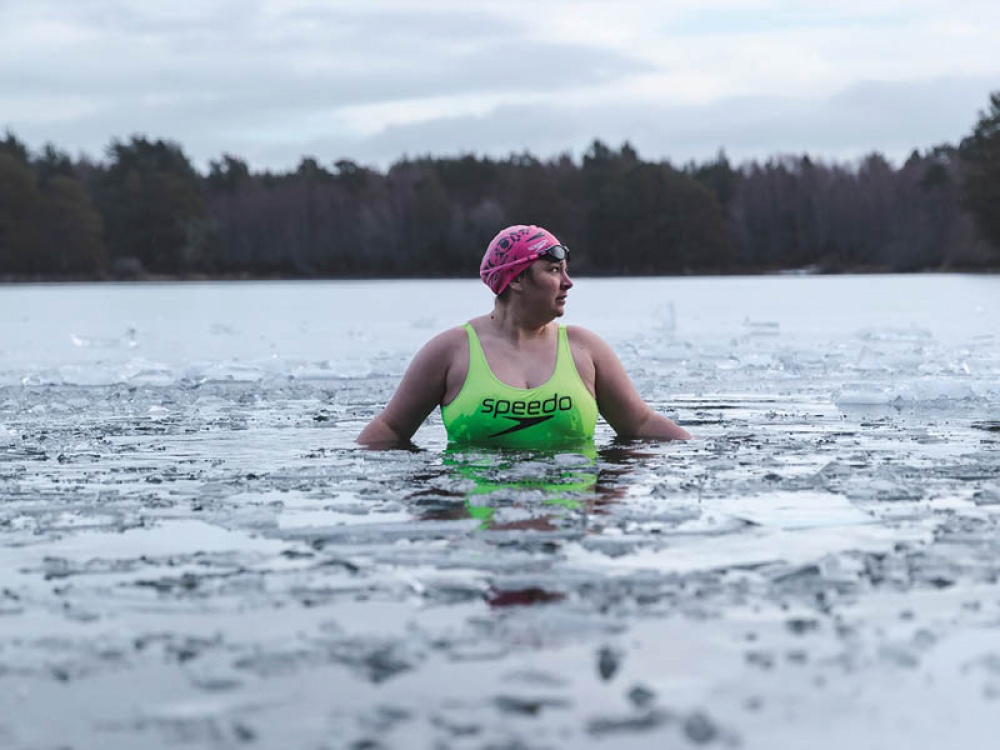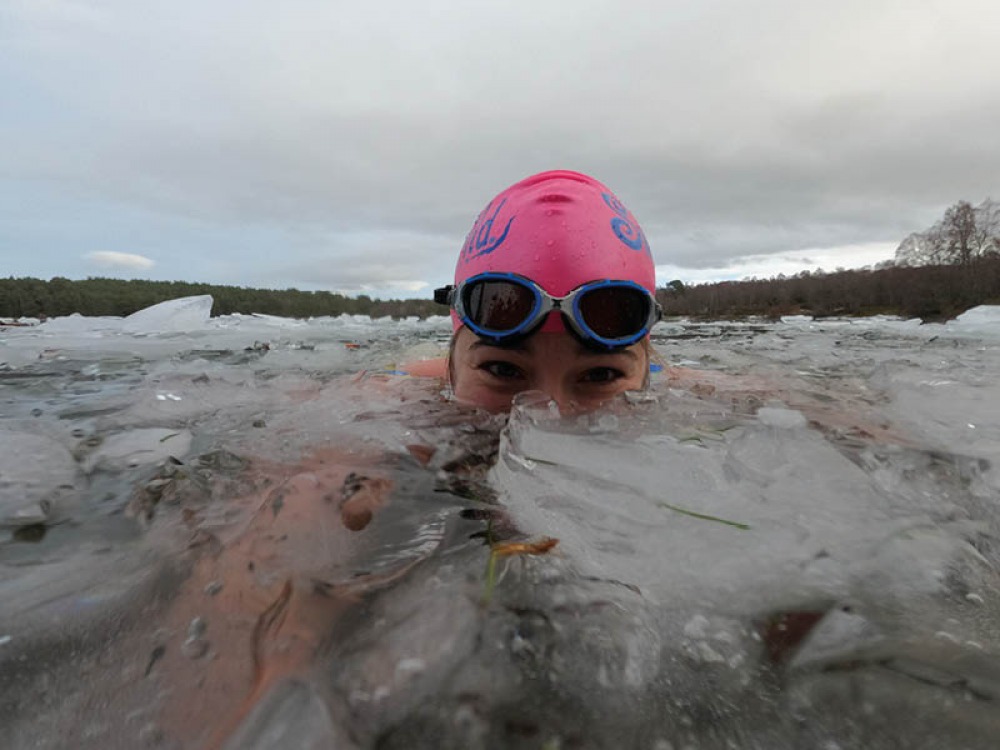A Sunderland Ice Swimmer Shares the Benefits of Open Water Swimming

Sunderland-based ice swimmer Becca Harvey shares the real benefits of plunging into ice cold water
Becca has been outdoor swimming for years. She’s completed an Ice Mile and has even organised an ice swimming festival. As open water swimming continues to prove popular across the North East, she seems the best person to ask for advice.
Becca began open water swimming in January 2018, which she says helped her with her PTSD after a car accident. ‘I didn’t really know what to do and I saw a documentary about people using alternative medicines to help. This wonderful BBC documentary was about a woman who was getting into cold water to help depression, and I thought “maybe I could do that!”,’ Becca explains. ‘I found others doing it in my local area at the time and started swimming with them. As soon as I got in the water, I was completely addicted. I was like “this is it!” It was the only place I didn’t feel pain. The community really welcomed me with open arms and I fell in love with the sport.’
One of Becca’s friends encouraged her to take things further after she took to ice swimming. ‘She said “you’ve got a knack for this, you could go a bit further” and I’d heard about this thing called an Ice Mile but never really paid it any mind. I said it was certainly in my five-year plan and she said “no, I think with training, you could do it next year”. So me, her and one of my other friends decided we’d train and aim towards an Ice Mile the following year. The more I read about the Ice Mile the more I realised I’d need to get better and faster.’

An Ice Mile is a one-mile swim under International Ice Swimming Association rules in water temperature of five degrees celsius or less, wearing a standard costume, goggles and a swim hat. ‘As I was training I didn’t really realise the impact that our changing weathers have. You think you’ll swim a mile in water below five degrees but with each passing year it gets increasingly harder to do,’ Becca explains. ‘You can’t do it in many places and I was training for three years before I even got to water to get an attempt – and that wasn’t because I wasn’t trying. The lake I’d tried to book it at didn’t get the temperatures, then the next year Covid hit, and trying to come back into training after Covid was really hard.’ Becca completed her swim at Loch Insh, Kincraig, Scotland, in March 2022 and is one of only around 700 people in the world who has completed the challenge of swimming a mile in water under five degrees.
At the beginning of this year a film by documentarian Rachel Sarah aired which followed Becca’s training for the Ice Mile, and premiered at The Fire Station in Sunderland. The film explored grief, healing, community – and the power of cold water swimming. Now Becca has medals from ice swimming championships, has organised a swimming festival, and has made ice swimming her career. ‘I never thought about ice swimming as a career, or the admin, writing and public speaking events. It’s just a dream,’ Becca says. ‘I’m working for Alice Goodridge, who has a company called SwimWild up in The Cairngorms. We run boat trips and winter retreats, but this year Alice is on maternity leave so now there’s a chance to do things a little closer to home! We ran a winter festival last year at Loch Inch with around 60 swimmers over the weekend. We cut a 25-metre pool out of the ice and that was the first time I thought “wow”. We’d put this all together and there’s an expertise that we share, and are able to share with other people.’
Becca has seen so many benefits of ice swimming and hopes to share this with others looking to give it a go. ‘The benefits are endless,’ she explains. ‘Reducing inflammation, the stress hormones that are released, it’s so beneficial to anybody, let alone anyone who already has these issues. Even if you’ve had a tough day at work, there’s something so refreshing about getting into cold water. Plenty of people talk about mindfulness and I call this extreme mindfulness because when you’re in water that cold, you can’t think about anything else other than how cold you are. When you get out and you’re giggling on the side and sharing hot chocolates, it’s giving you a real community boost as well. The friends that I’ve been to dips with are life-long friends, it always leads into other things and that’s the type of community I want to be part of. Personally, it’s given me so much confidence. Even body confidence. If you put me in a gym pool I’ll still be that shy person in the corner thinking they’re a rubbish swimmer, but put me outside where everyone’s on the same playing field, and once you’re in that water no one cares what you look like. That’s completely changed the way I look at myself.
‘There are plenty of people out there who want to try this, and we just want to show them how to do it safely. The more winters we do it, the more we see people doing potentially dangerous things. I completely relate to that because when I first started outdoor swimming, I was completely desperate, thinking “what have I got to lose?” Actually being that desperate and putting all of your eggs in one basket can be quite damaging if it doesn’t have the effect you want it to have.
‘People say they’ll get into an ice bath and how great it is for you. You think, yes it is, but if someone’s pinned all their hopes on that being a natural cure, it can be quite dangerous. We want to spread the message that you can absolutely do it, but we’ve got advice to help. We want to be able to help people in the North East experience their local area in a different way to how they usually do. This winter I’m just hoping to get back to the fitness I used to have. I’ve been injured for quite a long time so I’m hoping to do a bit more distance in the ice, whilst enjoying it and not putting too much pressure on myself.’
Your happy place in the North East?
Roker beach. It’s my favourite place because it’s the first place me and my partner went swimming in Sunderland. It’s got such a pull for me now, all along that little stretch when it meets Seaburn and Whitburn. We celebrate there and it’s also there where my partner asked if we should live together. It holds so many memories.
An inspirational quote you love?
Last night I watched Nyad. It’s about Diana Nyad attempting to become the first person ever to swim from Cuba to Florida. She was saying how ‘a diamond is a lump of coal that stuck with it’. That hit me right in the soul.
How do you spend your down time?
I love taking my dog for a walk. She takes up quite a lot of my time! But I also love beach-combing with my partner. I enjoy walking along the beach and seeing what we find, not necessarily taking it. There’s a lovely different type of mindfulness that comes with that. I love a cosy film night in too. I’ve been counting the days to putting my electric blanket on!
What’s your favourite thing about living in the North East?
The people. It’s really cliché to say but everyone’s so friendly. Everyone smiles at you regardless.
Have you got a favourite podcast to listen to?
I’ve got a few on the go! I love Off Menu with Ed Gamble and James Acaster, and also Brett Goldstein (one of the writers of Ted Lasso) has a film podcast [Films To Be Buried With] with comedians and actors about films that have changed their life. I’ve found new films to watch through listening to that. There’s also Invisibilia which is a really good one to listen to if you’re wanting to learn or question something.
Watch The Ice Mile at vimeo.com/ondemand/theicemile and follow Becca on Instagram @becca.harvs. There are various wild swimming groups to join across the region.
In the colder months wetsuits are advised. You will lose body heat far more quickly than in a heated indoor swimming pool.
Wear brightly-coloured swim caps, and safety buoys are advised, plus a waterproof watch so you can keep an eye on the time you spend in the water.
Ease into the water so you don’t send your body into shock.
Practise in a safe zone and increase your range slowly.
Never go alone, no matter how safe you think it is, and always tell someone where you are swimming.
It can take longer than you think to warm up once you’re out of the water, so have plenty of clothing ready.







